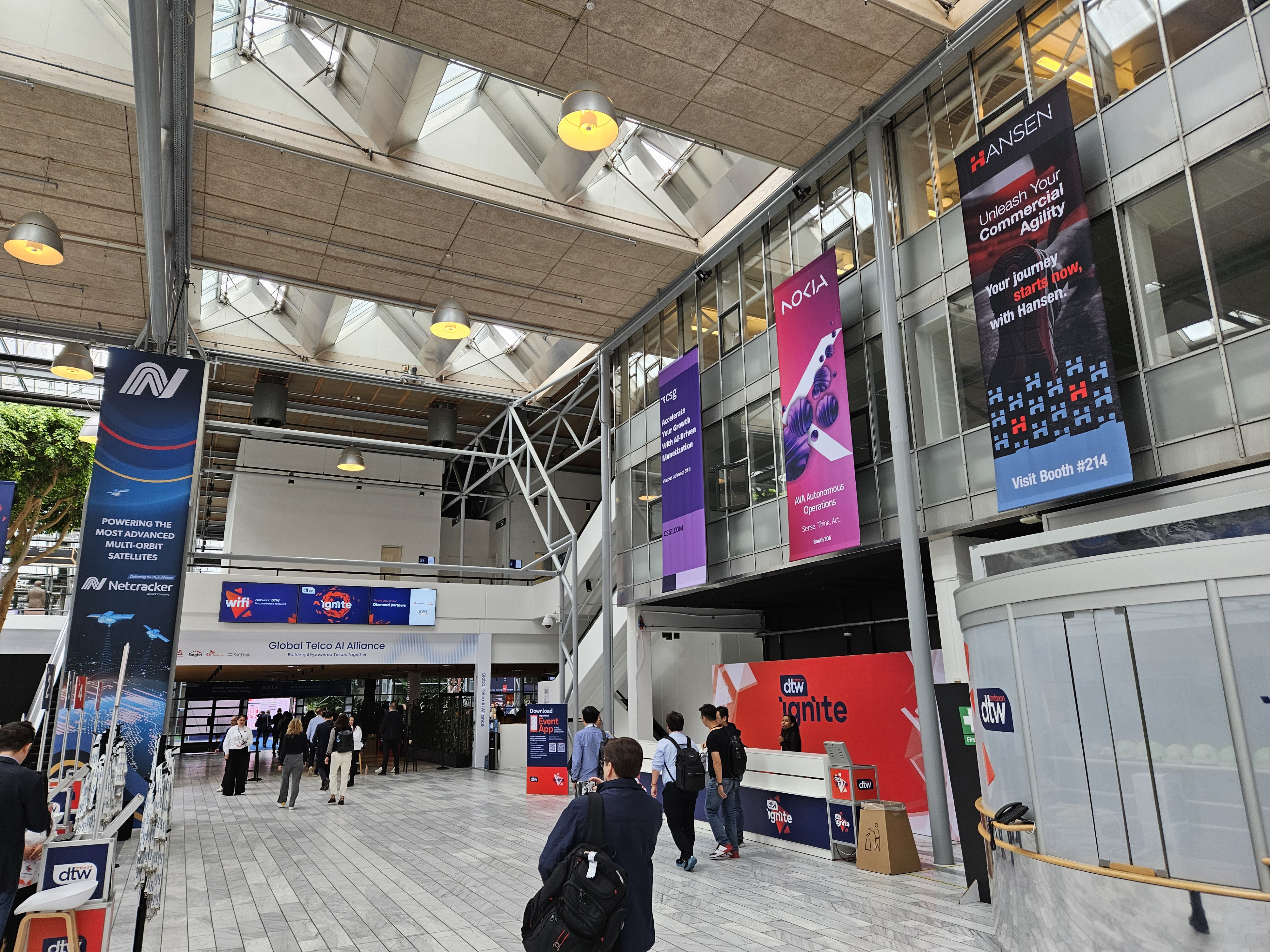When I covered the Telemanagement Forum’s DTW24-Ignite conference last year, the story was about digital disruption.
Such disruption was still an important theme at this week’s TM Forum DTW Ignite conference in Copenhagen – but the epicenter of the disruption buzz this year was agentic artificial intelligence.
Because of its leadership with open application programming interface standards, data formats and architectures, TM Forum attracts vendors that offer technologies to help telco operators transform themselves. AI is a natural fit for such technology offerings.
However, AI agents – autonomous AI-driven applications that can learn over time – are still new on the market, consisting more of hype than reality. After all, it’s not clear just how autonomous people want agents to be or how well they should learn on their own.
Despite such growing pains, agentic AI was the topic of the minute at DTW Ignite – and some vendors’ agents offered more than handwaving. Here are my top picks:
AI agents for intent-based networks
Intent-based networking is an approach for managing networks that uses the business intent for the network as input, translates it into operational intent that the network can represent as configuration metadata.
The network can then leverage these metadata to automatically configure the network and, furthermore, monitor the network on an ongoing basis to ensure its configuration doesn’t drift from the business intent.
Two of the vendors at DTW Ignite take intent-based approaches to supporting customer requirements.
Radcom Ltd. leverages AI to build preemptive, intent-based models of telco networks. These models understand the behaviors and complaints of individual subscribers. With this understanding, Radcom can predict each subscriber’s intent to churn, or cancel the service.
This preemptive approach supports Radcom’s AI agents that can validate ServiceNow tickets by correlating them with patterns of issues within the network. Radcom also offers agents that can provide VIP subscribers with dedicated support as well as cross-sell and upsell opportunities.
Inmanta NV offers an intent-based service orchestration platform for telco operators that combines turnkey network automation with simple deployment and lifecycle management for mobile private networks and dynamic network slices.
Inmanta leverages AI agents to predict issues before they occur and adapt and optimize the operational response to the business intent. With the help of these agents, Inmanta can proactively take action at the operational level to address issues before they impact end-users.
AI agents for modernizing the telco customer experience
Telco operators have long leveraged business support systems, or BSS, to provide customer-facing functions like order fulfillment, billing, product management and customer support.
For legacy operators – telcos with older technology systems – BSS capabilities live in data silos, separate from modern digital touchpoints such as mobile apps and websites, leading to a poor customer experience. Modernizing BSS, therefore, is a top priority for such operators.
To address this modernization challenge, AwareX Inc. offers dozens of prebuilt customer journeys for telco operators that enable legacy operators to improve their customer experience and in turn, their customer lifetime value.
AwareX leverages TM Forum’s standardized APIs and data structures as well as its open digital architecture to simplify integration with telcos’ existing BSS. The AwareX platform adds support for multiple digital touchpoints in what is essentially an omnichannel model across the telcos’ web sites, mobile apps and social media presences.
AwareX then leverages AI agents to offer proactive interactions with subscribers – identifying, say, when a different mobile plan might save a subscriber money. This proactive behavior combined with AwareX’s omnichannel interactions give mobile operators the ability to offer a dramatically improved customer experience.
AI agents for proactive IT and network operations
Managing telco and enterprise networks is a herculean task, given the complexity and mission-criticality of the technology.
Resolving problems after they occur is too late. Reducing the mean time to repair, or MTTR, is essential – ideally by solving problems before they impact end-users.
AI agents can serve an important role for addressing network issues preemptively. To this end, Unryo Inc. automatically builds a contextualized view and topology map of a telco’s or enterprise’s systems and then leverages AI agents to correlate information about anomalies and assist in investigations of issues on the network.
Though other vendors are leveraging agentic AI to discern and remediate network issues, Unryo also gathers data from server and storage infrastructure as well as Kubernetes deployments, leveraging AI to correlate issues across the entire infrastructure landscape.
AI agents can also serve an important role when observability technology generates massive data streams. Canopus Networks Pty Ltd. leverages data from eBPF that supports fine-grained observability directly within the Linux kernel. These data provide insights into the quality of experience or QoE for every user on every application across the entire network.
Such data streams are massive, especially on real-time telecom networks as well as enterprise networks. Canopus offers AI agents that monitor the QoE, looking for commonality among detected issues across common cell towers, applications or geographic locations.
Based upon such commonalities, the Canopus agents can identify anomalies in the QoE of real-time data streams and then generate contextualized reports of problems for operators to resolve.
Incumbent software vendors are also finding that agentic AI can be an important part of a comprehensive service operations management offering.
BMC Helix Inc. is making a name for itself in the agentic AI segment after its recent split from BMC Software. Helix combines IT service management, IT operations, DevOps and AIOps into a coordinated approach to addressing issues across the digital landscape.
Helix has leveraged AI since 2019 – long before the agentic wave – providing predictive, correlative and causal AI capabilities within its AIOps offering.
This expertise with AI positions the company well to take advantage of agents. In fact, Helix offers several AI agents in production today, including a change risk adviser, a vulnerability resolver and an insight finder – agents that extend the capabilities of its AIOps tools.
The Intellyx take
Dozens of vendors at DTW Ignite were touting some application of agentic AI or another. Cutting through the hype required a keen sense of what’s real vs. the AI-washing that has become so familiar.
The six vendors highlighted in this article are all examples of agentic AI in action. True, many of their offerings are still immature – but they are all currently in the market, helping telcos (as well as enterprises) deal with modernization, proactive management and digital transformation challenges.
For the telecommunications industry generally, the innovation that agentic AI represents is a breath of fresh air. Remember, this industry has over a century of innovation under its belt, from relays to switched networks to TCP/IP networking to mobile telephony. AI – agentic AI in particular – represents the latest wave of innovation for this dynamic industry.
Jason Bloomberg is founder and managing director of Intellyx, which advises business leaders and technology vendors on their digital transformation strategies. He wrote this article for News. BMC Helix and BMC Software are Intellyx customers, and ServiceNow is a former Intellyx customer. None of the other organizations mentioned in this article is an Intellyx customer.
Photo: Jason Bloomberg
Your vote of support is important to us and it helps us keep the content FREE.
One click below supports our mission to provide free, deep, and relevant content.
Join our community on YouTube
Join the community that includes more than 15,000 #CubeAlumni experts, including Amazon.com CEO Andy Jassy, Dell Technologies founder and CEO Michael Dell, Intel CEO Pat Gelsinger, and many more luminaries and experts.
THANK YOU










